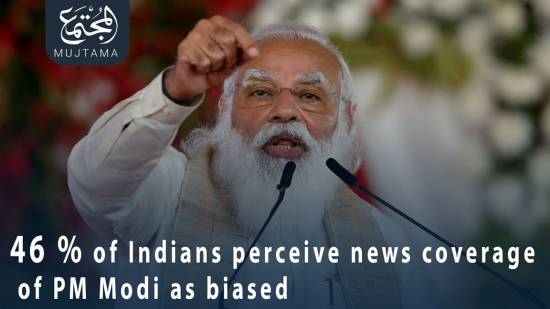46 % of Indians perceive news coverage of PM Modi as biased Featured
By Syed Ali Mujtaba
New Delhi: A report by Delhi-based think tank Lokniti-CSDS and Germany’s Konrad Adenauer Stiftung finds that 46 % of Hindus and Muslims who follow various media sources perceive news coverage of PM Modi as biased. They also believe that the Modi government is portrayed too favorably in the Indian news media.
Only about one in five news consumers responded that the media in India gives balanced political coverage and said, neither is it too favorable towards the government/opposition nor is it too unfavorable.
The report is released on October 20, 2022, and is titled ‘Media in India: Access, Practices, Concerns, and Effects.’ The report used data to show how different communities are consuming news and how the media landscape is transforming in India.
Media Trust Deficit
“Muslim news consumers are less trusting of the news media than Hindu news consumers says the report. It adds, their trust levels in private news channels and AIR news is quite low and both communities trust the online news websites the least.
‘But people have bestowed trust on government services and websites for information and Doordarshan news channels and media still remain the most-trusted, among the religious communities’ says the report.
The extent of the trust deficit also depends on political leanings. “Those leaning towards Congress and regional parties are less trusting of all types of media, compared to those inclined towards the BJP. Congress supporters are, on average, the least trusting the news media reports,” finds the report.
The findings of the report are based on a sample survey of 7,463 Indian citizens aged 15 years and above, carried out in January this year across 19 states and union territories, excluding parts of the Northeast and Kashmir.
Television vs Smart Phones
Television, by and large, remains the most popular medium for accessing news across the country. The report found that social media, though the game changer in the media landscape because of access to information, has come with its own baggage, as it heavily depends on smartphone ownership.
Regional vs National news
“News consumers in the cities stand out in their preference for nonlocal news. They consume national news more compared to news consumers in towns and villages. Those residing in villages take the least interest in national news. The report also highlighted how people in cities were more interested in national news than what is happening locally. The report sums up that as urbanity increases; interest in national news also increases.
The strongest preference for national news was found among news consumers of Delhi and Haryana. Rajasthan too leaned more toward national news. In northwest India, the survey found consumers prefer national news more than local news. As far as state news is concerned, it was most strongly preferred in Assam, Chhattisgarh, Odisha, and Andhra Pradesh. In south India consumers are inclined towards hyper-local and international news, says the report.
Supporters of Political Parties and News Consumption
There is a stark gap in trust among supporters of political parties in news outlets. Patterns of news consumption differed among supporters of the ruling BJP and opposition parties. The report claimed that most readers of English newspapers supported the Congress, while consumers of Hindi news seemed to incline towards the BJP. “The proportion of individuals that mostly read the newspaper in English is around 3% but among this tiny segment, the Congress enjoys the most support. This is not the case among readers who read newspapers in other languages,” says the report.
Surveillance Issue
The respondents have divided the issue of the “ethicality/morality” aspect of government surveillance of content on social media. “45% of social media users believe there is nothing wrong with surveillance and 40% believe it is wrong. Active users of Facebook and ‘What’s App’ is the most likely to be concerned about their privacy being compromised. Single active users appear to be the least concerned about their privacy being compromised while using these apps.
Google and Yahoo enjoy trust when it comes to privacy-related matters. Social media companies on the other hand are divided on the trust for privacy issues. Those who trust are 37% and those who do not are 38%.
The perception that the government monitors people’s online and phone activities is strongest among active internet users of North West and North India. Many in South India gave a qualified answer that the government monitors only some people, not all,” says the report.
Fake news Issue
The report also looks at the dissemination of fake news. Participants of the survey accepted that they received and forwarded news items and messages that may not have been entirely true.
“Nearly half of active internet users and social media and messenger platform users admitted to having been misled by fake news or information online at some point.”
“Around two-fifths of active internet users and social media users admitted to having shared/forwarded misinformation at some point of time; i.e. they unknowingly and unintentionally shared/forwarded fake news and realized later that it was false.”
The more educated respondents were “more likely” to admit to having been misled by fake news than the ones who weren’t, simply because they remained unaware of what they shared being fake.” reads the report.


